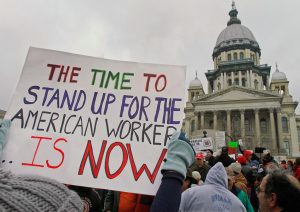The Problem with Right to Work
< < Go Back
Given how regularly President Donald Trump’s election is attributed—wrongly or rightly—to his ability to speak to Americans who feel alienated by the modern, global economy, it would be wise for Republicans in Congress to pause in their push to hobble worker power. Nonetheless, days after President Trump’s inauguration, Republicans introduced a so-called right-to-work bill that would weaken the bargaining power and lower the wages of working people.1
One of the things to pay attention to in [a] South Carolina ad is [the] implicit defense of the state’s “right to work” law, which makes it more difficult for unions to organize. I wouldn’t be surprised to see [him] tout right-to-work laws as part of his strategy for reviving the economy.
The problem, of course, is that said laws do nothing of the sort. The Economic Policy Institute has a great primer on the actual effect of right-to-work laws on workers, wages, and employment. On the whole, RTW laws “reduce wages by $1,500 a year, for both union and nonunion workers”; “lower the likelihood that employees get healthcare or pensions through their jobs … for both union and nonunion employees”; and “have no impact whatsoever on job growth.”
More From The American Prospect:
More From Congress for American Progress:




